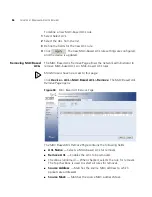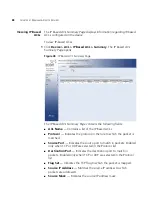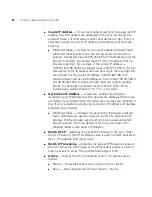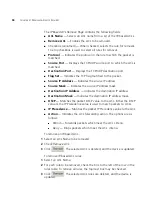
Defining Access Control Lists
91
Add Rules to ACL
■
Protocol
— Defines the protocol in the rule to which the packet is
matched. The possible fields are:
■
Select from List
— Selects a protocol from a list by which packets
are matched.
■
Protocol ID
— Adds user-defined protocols by which packets are
matched. Each protocol has a specific protocol number which is
unique. The possible field range is
0-255
.
■
Source Port
— Defines the source port that is used for matched
packets. Enabled only when TCP or UDP are selected in the Protocol
list. The field value is either user defined or
Any
. If
Any
is selected the
IP based ACL is applied to any source port.
■
Destination Port
— Defines the destination port that is used for
matched packets. Enabled only when TCP or UDP are selected in the
Protocol list. The field value is either user defined or
Any
. If
Any
is
selected, the IP based ACL is applied to any destination port.
■
TCP Flags
— If checked, enables configuration of TCP flags matched
to the packet. The possible fields are:
■
URG
— Urgent pointer field significant. The urgent pointer points
to the sequence number of the octet following the urgent data.
■
ACK
— Acknowledgement field significant. The acknowledgement
field is the byte number of the next byte that the sender expects to
receive from the receiver.
■
PSH
— Push (send) the data as soon as possible, without buffering.
This is used for interactive traffic.
■
RST
— Reset the connection. This invalidates the sequence
numbers and aborts the session between the sender and receiver.
■
SYN
— Synchronize Initial Sequence Numbers (ISNs). This is used to
initialize a new connection.
■
FIN
— Finish. This indicates there is no more data from the sender.
This marks a normal closing of the session between the sender and
receiver.
For each TCP flag, the possible field values are:
■
Set
— Enables the TCP flag.
■
Unset
— Disables the TCP flag.
■
Don’t Care
— Does not check the packet’s TCP flag.
Summary of Contents for 3CRDSF9PWR-US - OfficeConnect Managed Fast Ethernet PoE...
Page 6: ...6 ABOUT THIS GUIDE...
Page 14: ......
Page 102: ...102 CHAPTER 4 MANAGING DEVICE SECURITY...
Page 112: ...112 CHAPTER 5 MANAGING SYSTEM INFORMATION...
Page 120: ...120 CHAPTER 6 CONFIGURING PORTS...
Page 140: ...140 CHAPTER 8 CONFIGURING VLANS...
Page 198: ...198 CHAPTER 14 MANAGING SYSTEM FILES...
Page 204: ...204 CHAPTER 15 MANAGING POWER OVER ETHERNET DEVICES...
Page 228: ...228 APPENDIX A 3COM NETWORK MANAGEMENT...
Page 234: ...234 APPENDIX B DEVICE SPECIFICATIONS AND FEATURES...
Page 238: ...238 APPENDIX C PIN OUTS...
Page 256: ......
















































